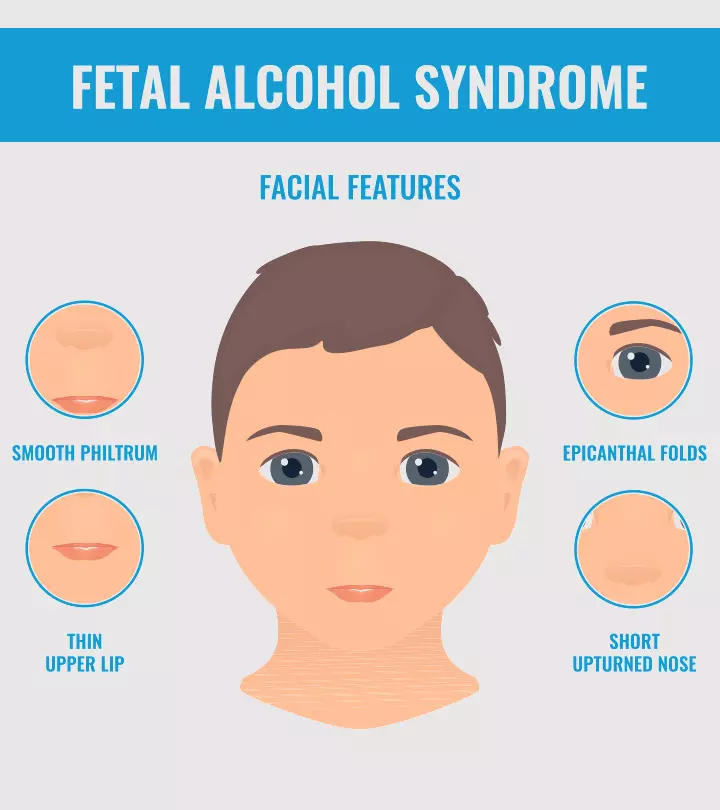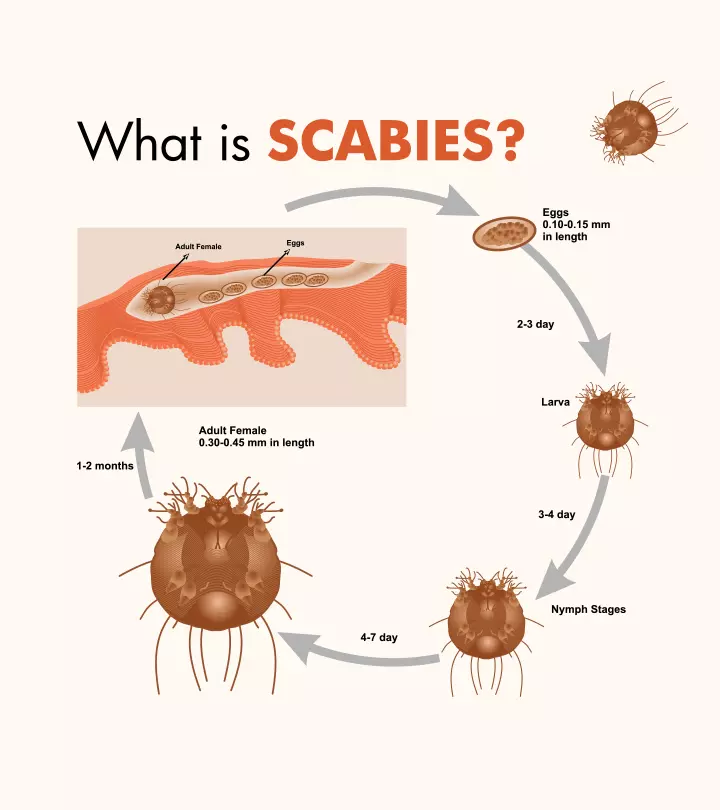
Image: Shutterstock
Fetal alcohol syndrome is a set of physical, mental, and behavioral problems identified in children whose mothers consumed alcohol during pregnancy. It is the most severe fetal alcohol spectrum disorder (FASD), a collective name given for the several problems that affect the children (1) (2). It is also considered a form of Fetal Alcohol Spectrum Disorders (FASDs) and a preventable cause of fetal cognitive impairment or dysfunction

The exact statistics of children born with fetal alcohol syndrome are unknown, but the Centers of Disease Control and Prevention estimates that it occurs at the rate of 0.2 to 1.5 cases per 1000 live births in some parts of the US. However, another study estimates that 0.5 to 2 cases of the syndrome occur in every 1000 live births (2).
Read the post about symptoms, diagnosis, treatment, and ways to help a child with fetal alcohol syndrome.
Key Pointers
- Women above 30 with a history of alcohol exposure and poor nutrition in the mother are risk factors for giving birth to a child with fetal alcohol syndrome.
- Symptoms of fetal alcohol syndrome are facial anomalies, small head circumference and brain size, small eye-opening, thin upper lip, short height, and low body weight.
- Untreated children’s conditions might cause secondary disabilities, such as mental health issues and trouble following laws.
What Are The Causes And Risk Factors Of Fetal Alcohol Syndrome In Children?

Alcoholic drinks, even in a small amount, consumed at any time of the pregnancy may put the fetus at risk of getting fetal alcohol syndrome. This is because different parts of the fetus develop at different stages of pregnancy, and the consumption of alcohol, a neurotoxin, may cause significant fetal growth retardation. Therefore, it is recommended that a woman stop drinking as soon as she is pregnant or trying to get pregnant (3). The Morbidity and Mortality Weekly Report estimates that during the time span of 2018–2025, 13.5% of pregnant women were currently drinking, and 5.2% were reported to be binge drinking in the US.
The other risk factors of giving birth to a child with fetal alcohol syndrome are (4):
- Women above 30 with a long history of alcohol exposure
- Poor nutrition in mother
- Already having a child with fetal alcohol syndrome
- Slow metabolization of alcohol in the mother’s body
Alcohol passes from the mother’s bloodstream into the growing fetus through the umbilical cord.
This causes higher blood alcohol concentrations in the fetus because its liver cannot metabolize the alcohol efficiently. Therefore, the alcohol stays in the fetus’s blood for longer and hampers the normal development of the brain and central nervous system. The different ways in which prenatal alcohol exposure affects fetal growth are (2) (5):
- It affects physical development because it kills the cells in different fetal parts.
- It hinders nerve cell development and brain growth.
- It contracts the blood vessels, thus lowering the blood supply to the fetus and causing a deficiency of oxygen and nutrients.
- When alcohol is processed in the body, toxic byproducts are released, interfering with fetal brain development.
 Things to know
Things to knowWhat Are The Symptoms And Complications Of Fetal Alcohol Syndrome In Children?
Fetal alcohol syndrome often increases the risk of genetic disorders in children. Children with fetal alcohol syndrome are characterized by growth deficiency and a cluster of physical abnormalities, such as the ones outlined below (2) (6):
- Facial anomalies (smooth area between the nose and upper lip)
- Small head circumference and brain size
- Small eye-opening
- Thin upper lip
- Short height and low body weight
- Decreased coordination and concentration
- Inability to differentiate between reality and fantasy
- Vision and hearing issues
- Inability to sleep or suck properly as an infant
- Problems in bones, heart, and kidneys
The neurodevelopmental disorder seen in children are:

- Intellectual disabilities
- Behavioral issues
- Problems with speech and language development
- Learning disabilities or poor school performance
- Poor memory
- Hyperactive behavior and low attention span
- Difficulties with reasoning and judgment
- Difficulty with mathematical skills
- Poor impulse control
Jill, a mom of five adopted children, discusses her son’s behavioral signs, which led her to suspect that he might have been exposed to alcohol in utero. She says, “Since January of this year, my son, Silas, has been displaying impulsive and destructive behavior and has no regard for what I say or what consequences I assign to various poor behaviors. If Silas wants to do something, he does it – regardless of what anyone says or what will follow afterward… I saw a pattern that I had seen before in Iryna (her elder daughter, who is also diagnosed with FAS) (i).” After some tests, it was confirmed that Silas had alcohol exposure.
Other complications that may arise in alcohol-exposed children are (6):
- Attention-Deficit/Hyperactivity Disorder (ADHD)
- Seizures
- Anxiety disorders
- Developing psychosis (a psychiatric illness where a person hears voices that are not real or has hallucinations)
If the children dealing with this condition are not treated on time, they may have secondary disabilities such as (2):
- Developing mental health issues
- Having trouble following laws
- Developing inappropriate sexual behavior
- Facing unemployment or having trouble with jobs
- Developing substance abuse disorders
How Is Fetal Alcohol Syndrome Diagnosed?

There are no specific tests for accurate diagnosis of fetal alcohol syndrome. Moreover, some of the fetal alcohol syndrome symptoms are similar to ADHD and Williams syndrome, which makes it even more difficult for healthcare providers to diagnose the condition with certainty. Therefore, most diagnostic clues are based on the child’s looks and the mother’s history of alcohol consumption. Physical findings such as notable developmental delays, behavioral issues, and school failure are some clues. Additionally, other indicators include (2) (5):
- Facial abnormalities
- Low birth weight
- Short height
- Issues related to the central nervous system, such as small head size, and hyperactivity
- Signs of alcohol withdrawal in newborns
- Shaking and high-pitched cry in newborns
How Is Fetal Alcohol Syndrome Treated In Children?

No specific treatment for fetal alcohol syndrome can reverse brain damage or any other organ damage. However, early diagnosis and alternative treatment options may help children overcome their challenges.
Some treatment strategies are (7):
- Special education programs and social services
- Different therapies such as physical therapy, educational therapy, and speech and language therapy
- Special classes to teach social skills
- Parental training and counseling
Medications may be prescribed for (5)
- Alcohol withdrawal in newborns
- ADHD
- Depression and anxiety
- Sleep problems
Other factors that may help alcohol-exposed children deal with the condition are (2):
- Early diagnosis, preferably before the age of six
- A supportive and loving environment at home
How Can Fetal Alcohol Syndrome Be Prevented?
Alcohol consumption by pregnant mothers is one of the major causes of congenital disabilities and intellectual problems in children in the US
(7). Fetal alcohol syndrome is preventable if women stop alcohol consumption during pregnancy.
The guidelines that should be followed are (2):
- A woman should stop drinking alcohol if she is trying to get pregnant or is sexually active because it takes around four to six weeks to know about conception and the growing fetus.
- If a woman has already been drinking alcohol during pregnancy, she must stop it immediately because the fetus grows throughout pregnancy.
- A woman should also avoid alcohol consumption during breastfeeding. Although it might not be linked to fetal alcohol syndrome, alcohol in the milk can cause developmental, learning, and sleep problems in the baby.
 Point to consider
Point to considerHow Can Parents Help Their Children With Fetal Alcohol Syndrome?

Since children with fetal alcohol syndrome deal with behavioral, learning, and developmental disabilities, they need a supportive environment at home and extra care from parents. Different ways in which parents can help them are (8):
- Setting a routine and clear rules for children to follow.
- Staying positive and concentrating on the outcome of the task and not on the inappropriate behavior.
- Teaching to deal with difficult situations by demonstrating examples and role-plays.
- Give one direction at a time, so it is easier to follow.
- Taking extra care in unsafe situations such as parking lots or busy streets.
- Avoid situations that overwhelm children, such as crowded places.
- Creating a calm and peaceful environment at home.
- Avoid bright colors in their rooms.
- Keeping the furniture simple and basic.
- Keeping children away from violence.
Frequently Asked Questions
1. Can FAS children live normal lives?
Children could have FAS-associated disabilities for a long time, and most would be carried to adulthood. However, little is known about how these features might change or affect children in various stages of their lives (9).
2. How long do FAS kids live?
The survival rates for people with FAS at birth are lower than that of the general population. Therefore, more effort is needed to educate mothers to follow precautionary steps to prevent the condition while pregnant (10) (11).
3. What medications are used to treat Fetal Alcohol Syndrome in children?
A child with FAS could be prescribed stimulants, antidepressants, anti-anxiety drugs, and neuroleptics to help control the symptoms. A doctor might recommend medications to the child based on their age, symptoms, the severity of the condition, and the effectiveness of the treatment (12).
Although there is no precise cure for this condition, children with FAS may have a wide range of developmental abnormalities and health complications when undiagnosed and left untreated. Therefore, the best way to prevent fetal alcohol syndrome is by abstaining from consuming alcohol during pregnancy. Nevertheless, if you suspect your child is showing any typical signs or could be at risk of developing the condition, seek medical care immediately to facilitate early diagnosis and prompt treatment. A child with FAS is creative and sociable, and with the proper treatment and support, they may lead a normal life and attain their full potential.
Infographic: Symptoms Of Fetal Alcohol Syndrome
Fetal alcohol syndrome may occur in a child after birth if the mother consumed alcohol during pregnancy. This condition may hinder a child’s daily activities and influence their physical and cognitive development. Nevertheless, early detection of the symptoms can help to improve the quality of life. For more information, see the infographic below.
Some thing wrong with infographic shortcode. please verify shortcode syntaxFetal Alcohol Syndrome is a critical condition that affects children when alcohol is consumed during pregnancy. Explore its causes, signs, diagnosis, and treatment in this educational video.
Personal Experience: Source
MomJunction articles include first-hand experiences to provide you with better insights through real-life narratives. Here are the sources of personal accounts referenced in this article.
i. FAS evaluation for Silas.https://mamapierce.blogspot.com/2013/05/fas-evaluation-for-silas.html
References
- Foetal alcohol syndrome.
https://www.nhs.uk/conditions/fetal-alcohol-spectrum-disorder/ - Fetal Alcohol Syndrome.
https://my.clevelandclinic.org/health/diseases/15677-fetal-alcohol-syndrome - Fetal Alcohol Spectrum Disorders: FAQs of Parents & Families.
https://www.healthychildren.org/English/health-issues/conditions/chronic/Pages/Fetal-Alcohol-Spectrum-Disorders-FAQs-of-Parents-and-Families.aspx - Demetrios Vorgias and Bettina Bernstein; (2025); Fetal Alcohol Syndrome.
https://www.ncbi.nlm.nih.gov/books/NBK448178/ - Fetal Alcohol Spectrum Disorder (FASD).
https://www.stanfordchildrens.org/en/topic/default?id=fetal-alcohol-spectrum-disorder-fasd-90-P02122 - Fetal Alcohol Syndrome (FAS).
https://www.aacap.org/AACAP/Families_and_Youth/Facts_for_Families/FFF-Guide/Fetal_Alcohol_Syndrome-134.aspx - Fetal Alcohol Syndrome.
https://kidshealth.org/en/parents/fas.html - Parenting a Child with FASD.
https://fosteringperspectives.org/fpv20n1/FASD.htm - Eileen M. Moore and Edward P. Riley; (2015); What Happens When Children with Fetal Alcohol Spectrum Disorders Become Adults?
https://www.ncbi.nlm.nih.gov/pmc/articles/PMC4629517/ - Nguyen Xuan Thanh and Egon Jonsson; (2016); Life Expectancy of People with Fetal Alcohol Syndrome.
https://pubmed.ncbi.nlm.nih.gov/26962962/ - Sarah Soyeon Oh et al., (2025); Hospitalizations and mortality among patients with fetal alcohol spectrum disorders: a prospective study.
https://idp.nature.com/authorize?response_type=cookie&client_id=grover&redirect_uri=https%3A%2F%2Fwww.nature.com%2Farticles%2Fs41598-020-76406-6 - Treatment of FASDs.
https://www.cdc.gov/fasd/treatment/?CDC_AAref_Val=https://www.cdc.gov/ncbddd/fasd/treatments.html
Community Experiences
Join the conversation and become a part of our nurturing community! Share your stories, experiences, and insights to connect with fellow parents.
Read full bio of Dr. Aldo Medina Serpa
Read full bio of Pragya Bhargavi
Read full bio of Dr. Ritika Shah
Read full bio of Dr. Joyani Das

















